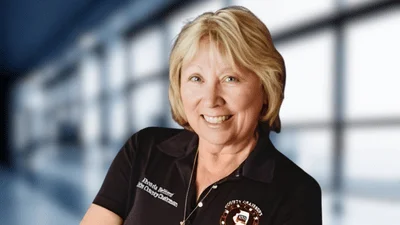Gubernatorial candidate Sen. Darren Bailey, left, and Pastor Corey Brooks stood together during their Nov. 29 joint news conference after their overnight Project H.O.O.D. campout on Chicago's South Side. | livestream.com/blueroomstream/
Gubernatorial candidate Sen. Darren Bailey, left, and Pastor Corey Brooks stood together during their Nov. 29 joint news conference after their overnight Project H.O.O.D. campout on Chicago's South Side. | livestream.com/blueroomstream/
If Gov. J.B. Pritzker and Chicago Mayor Lori Lightfoot heard gubernatorial candidate and Sen. Darren Bailey (R-Xenia)'s call for action earlier this week to combat gun and gang violence in the state, they haven't mentioned it.
Bailey issued the call the morning after he spent a frigid night on Chicago's South Side, during which he heard gunshots, at least one woman's screams and a steady stream of fire and rescue vehicles on a Woodlawn neighborhood street.
"Friends, we have got to get our heads together, we have got to start electing leaders," Bailey said during the news conference the morning of Monday, Nov. 29. "J.B. Pritzker, Mayor Lightfoot, where are you?"
Neither the governor's nor the mayor's offices have issued a response.
Bailey spent the prior night on the South Side with New Beginnings Church Pastor Corey Brooks and others as part of the tenth annual Project H.O.O.D. (Helping Others Obtain Destiny) Tent-A-Thon, intended to boost awareness to violence in the state. Brooks, founder of Project H.O.O.D., invited community leaders, politicians and others to camp out in relative safety on the roof of his home during the Tent-A-Thon.
Bailey showed up, bundled warmly against that night's expected subfreezing temperatures and heard stories about what he, the following morning, called "the forgotten people of this neighborhood."
Pritzker and Lightfoot were nowhere to be seen.
What happened at 2 a.m. could not have been too much of a surprise — it happens in that neighborhood all the time — but it was still shocking to Bailey.
"We were camping out in a tent at the end of this platform last night," Bailey said, motioning to the platform on which the news conference took place. "At two o'clock in the morning we heard gunshots. These gunshots less than a hundred yards over. I'm laying there thinking, okay that surely was something else. About fifteen minutes later I heard a female voice screaming he's been shot."
Then came police and fire vehicles, in addition to at least one ambulance.
"What on earth is going on in the city of Chicago and why isn't this being addressed?" Bailey said. "Every Monday morning, we get up and we look forward to the headlines, unfortunately, to see how many shootings and how many deaths have taken place here in Chicago. And we in Illinois have to realize that this isn't just a problem in Chicago. This is becoming an every-urban-area problem. It's taking place in Champaign and Decatur, all over this state."
Bailey asked why Chicago Police "are so stifled in their work" and why fire trucks and ambulances have to drive up and down King Drive all night long.
"Why?" Bailey continued. "This has been going on far too long."
Bailey demanded that Pritzker and Lightfoot produce and plan to combat violence in the state and to work with local non-profits to combat that violence. He said he would produce his own action plan "in the near future," a plan "to bring law an order not just to Chicago, but to the state of Illinois."




 Alerts Sign-up
Alerts Sign-up